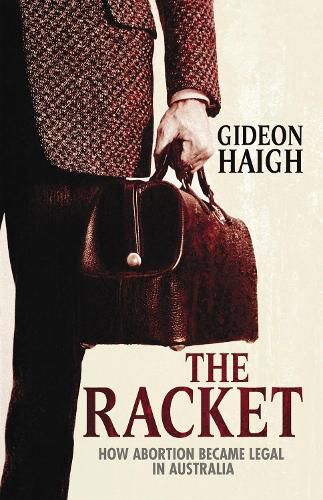Readings Newsletter
Become a Readings Member to make your shopping experience even easier.
Sign in or sign up for free!
You’re not far away from qualifying for FREE standard shipping within Australia
You’ve qualified for FREE standard shipping within Australia
The cart is loading…






A generation ago in Australia, abortion was a crime. It was also the basis of one of the country’s most lucrative and longest-lasting criminal rackets.
The Racket describes the rise and fall of an extraordinary web of influence, which culminated in the landmark ruling that made abortion legal, and a public inquiry that humiliated a powerful government and a glamorous police force. With forensic skill and psychological subtlety, Gideon Haigh brings to life a story of corruption in high places and human suffering in low, of murder, suicide, courtroom drama, political machinations, and of the abortionists themselves- among them a multi-millionaire philanthropist, a communist bush poet, a timid aesthete and a bankrupt slaughterman.
It is the story, too, of Bertram Wainer, abortion’s crash-through-or-crash campaigner, and the moral issue he bequeathed which still divides Australians.
$9.00 standard shipping within Australia
FREE standard shipping within Australia for orders over $100.00
Express & International shipping calculated at checkout
A generation ago in Australia, abortion was a crime. It was also the basis of one of the country’s most lucrative and longest-lasting criminal rackets.
The Racket describes the rise and fall of an extraordinary web of influence, which culminated in the landmark ruling that made abortion legal, and a public inquiry that humiliated a powerful government and a glamorous police force. With forensic skill and psychological subtlety, Gideon Haigh brings to life a story of corruption in high places and human suffering in low, of murder, suicide, courtroom drama, political machinations, and of the abortionists themselves- among them a multi-millionaire philanthropist, a communist bush poet, a timid aesthete and a bankrupt slaughterman.
It is the story, too, of Bertram Wainer, abortion’s crash-through-or-crash campaigner, and the moral issue he bequeathed which still divides Australians.
Gideon Haigh is quite simply one of the best – and most intriguing – writers working in Australia today. He is amazingly prolific on a variety of subjects, but entirely consistent in delivering elegant prose that engages thoughtfully with his subject and wears its (often considerable) research lightly.
The Racket is a narrative history of abortion in Australia prior to its legalisation in 1968, detailing the Mob-like web of criminal influence that ran the highly lucrative ‘racket’ and fleshing out the stories of the people caught in it, from the abortionists, police and courts; to the hospitals often charged with finishing dangerously half-done jobs; the women and their families who were driven to what was then a dangerous and desperate act; and Bertram Wainer, abortion’s crash-through-or-crash campaigner.
This is not a book that makes moral judgments on either side, but it does give us a local and historical perspective on an issue that is often framed, these days, in terms of the quite different contemporary American debate about right-to-life versus right-to-choose. For me, this book brought home how important it is to have access to safe medical abortions – the alternatives for desperate people, as shown here, are deeply disturbing.
[[jo2]] Jo Case is the editor of